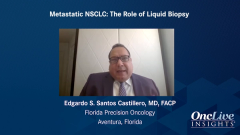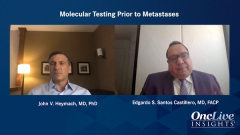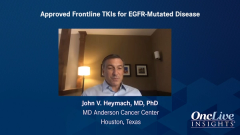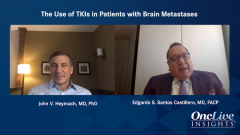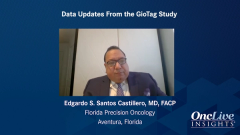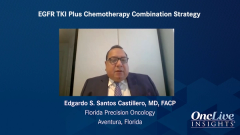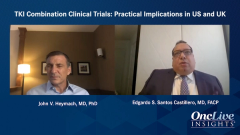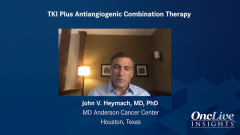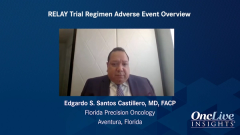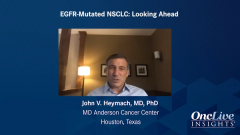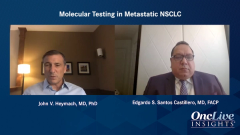
TKI Combination Clinical Trials: Practical Implications in US and UK
Episodes in this series

John V. Heymach, MD, PhD: One of the issues with the Tata Memorial Centre study that was done in India is this: It’s been observed that patients don’t cross over to get all the subsequent therapies that they do in the United States. For example, the use of osimertinib is much lower. To what extent do you think the findings from those studies will be relevant in the United States or western Europe with the treatment? Do you think the principle should be the same no matter what?
Edgardo S. Santos Castillero, MD, FACP: That’s a good point, John. In western Europe and in the United States, we have a facility for drug access, and we may not have that kind of pressure that other colleagues in other latitudes may have. In that approach, you’re questioning in 2 senses. In those countries, when they don’t have the resources we have, it is important. It is important because in the study you just mentioned, at least 40% of the people did not receive second-line chemotherapy. By moving the chemotherapy to the up-front setting, you’re giving everything together and getting that higher efficacy. The study shows that we have the patient use longer. That is 1 point. This is important.
The other thing we mentioned is about drug access. That’s a major issue but not for us. We cannot forget, John, that both studies were strongly positive for overall survival. Here the United States and in western Europe, we need to keep an eye on that. The studies are ongoing because we cannot hide the impressive data that came from those phase 3 trials.
John V. Heymach, MD, PhD: You’re right. Personally, I’ve got mixed feelings with it. There was a study in the United States. It was a CALGB [Cancer and Leukemia Group B] study, and Pasi Jänne was the lead of this. It combined erlotinib with carboplatin and paclitaxel vs erlotinib alone. There was a bit of benefit; the benefit was mainly for the L858Rs, not to the exon 19, but it wasn’t a significant benefit overall. Here, the benefits were striking. They were undeniable. It’s overall survival. It’s clear-cut, as you said, in these 2 studies, and they involved gefitinib. Is there a difference of gefitinib vs erlotinib, or is there a difference with the populations? It’s hard to know, but I share with you the eagerness to see the osimertinib study. It will be very interesting to see how that comes out.
Let me play this out. Let’s say a study like that turns out to be positive. Knowing what you know right now, if you were treating patients in those places, would you use the chemotherapy and TKI [tyrosine kinase inhibitor] in the up-front setting, or would you pick a particular population based on what you see from this?
Edgardo S. Santos Castillero, MD, FACP: If I am in those areas, living there and practicing there, I would use the combination.
John V. Heymach, MD, PhD: Yes.
Edgardo S. Santos Castillero, MD, FACP: Yes, no question. I would use the combination. When you go deep in the data from the paper, and you say, “What was the problem?” You see carboplatin and pemetrexed. There was chemotherapy-induced myelosuppression and nephrotoxicity, but it’s only 4 cycles of carboplatin-pemetrexed. When I analyzed the dosing, the standard of care is this: After 4 cycles, you do the carboplatin, so you may expect myelotoxicity. But I don’t know, John. I’m sure that, in our practice [Florida Precision Oncology], it is rare to see myelotoxicity from pemetrexed alone or in combination with gefitinib when you give prophylaxis to the patient with adequate B12 replacement and folic acid. I don’t recall a patient of mine in the last 10 years for whom I have had that problem with myelotoxicity with pemetrexed.
John V. Heymach, MD, PhD: No, they tend to do well. That’s right. We’ll see how the osimertinib studies work out, but it is an interesting finding. I’ll say that there’s 1 point that it illustrates for me. All of us, when we think about our own practices, think that everybody is going to get second-line or third-line treatment, but the fact of the matter is this: Things happen to lung cancer patients. Patients sometimes have unexpected problems that arise, or they get blood clots or infections and so forth. There have been a number of studies that show giving your best therapies or your best combinations up front is often a better approach than holding things for later because you sometimes don’t make it to later, even if you think you’re going to.
Edgardo S. Santos Castillero, MD, FACP: Absolutely. John, I also want to mention that, when the time comes, and we need to compare those trials, it will be difficult because what the trial from India includes was, for me, very impressive. They have more than 20% of the patients PS [performance status] 2, which is a very bad performance status. When we review the trials using TKIs, all of them have ECOG [performance status] equal to 0 to 1, so that’s something to keep in mind. Both studies also include those rare mutations that you just mentioned. They include 719, L61, and 768, which were not in the FLAURA study. They were not in the ARCHER 1050 study, and they were not on the afatinib trial initially because they removed them from analysis as you remember. Those 2 studies were what we see in reality, so that’s something to keep in mind.
John V. Heymach, MD, PhD: I agree with you. It’s exciting that we have a good first-line option, but there’s clearly room to improve on it.
Edgardo S. Santos Castillero, MD, FACP: No question. No question.
Transcript edited for clarity.


